JEDDAH: For most of the past two months, all eyes have turned to Gaza, the strip of land on the southern tip of ancient Palestine, as shells and missiles have flattened the land, displaced millions and injured and killed thousands.
Due to restrictions on external reporting, much of the world’s view of these events has come from local reporters equipped with cameras, documenting the harsh realities faced by their community.
Journalists and reporters from the Arab region and beyond have long considered Palestine a crucial subject for coverage. The advance of military technology has only intensified the brutality of the assault the Palestinians have endured in the face of the Israeli army. The most recent bombardment on the Gaza Strip, once less visible to Western media, has now reached the world through the efforts of reporters and photographers from within the besieged area.
In the past few weeks, four Arab News reporters have traveled with Saudi Arabia’s aid agency KSrelief to deliver ambulances and aid and help the UAE’s Ministry of Foreign Affairs, documenting their journeys while helping to evacuate people from Egypt’s Al-Arish Airport.
Ghadi Joudah, Abdulrahman Shalhoub, Sherouk Zakaria, and Mohammed Sulami traveled with aid convoys and medical teams, providing assistance, while reporting and sharing eyewitness accounts of their experiences
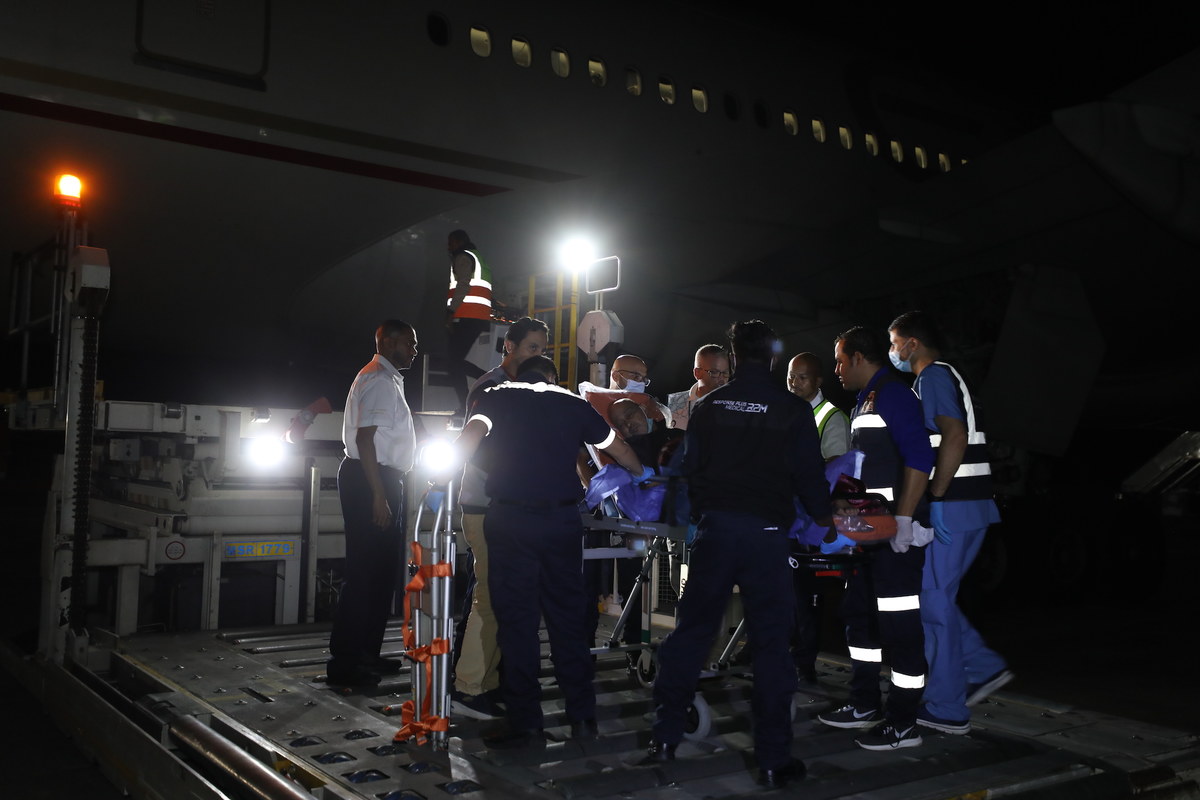
A patient is seen lays down on a stretcher before boarding an evacuation flight bound for Abu Dhabi. (AN photo by Mohammed Fawzy)
For journalists, the opportunity to report from Palestine, especially during times of active conflict, is both rare and perilous. The recent heavy bombardment has made it one of the most dangerous places for journalists, with many being restricted from entering.
Departing from Riyadh’s King Khalid International Airport aboard the ninth Saudi relief plane on Nov. 9, Riyadh-based reporter Joudah and photographer Shalhoub boarded one of four cargo planes transporting ambulances that were set to cross through to Gaza via the Rafah border crossing.
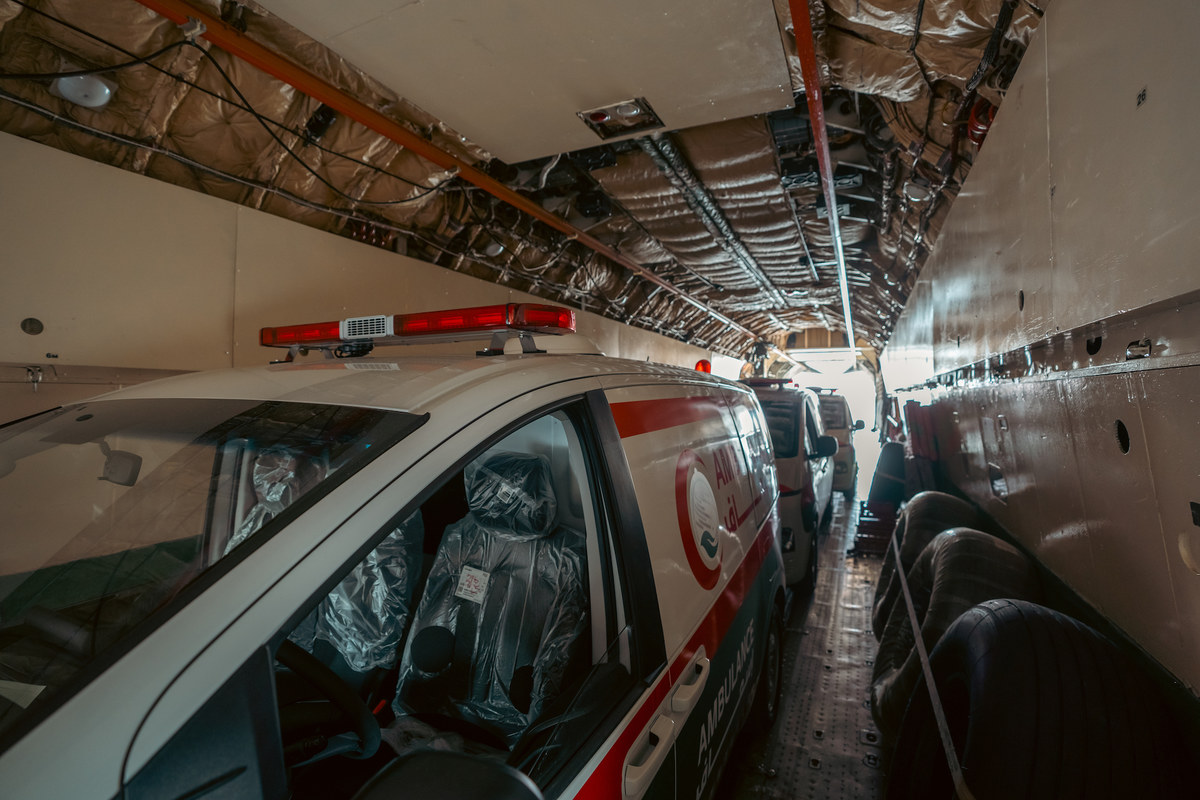
Saudi aid agency KSrelief has delivered 20 fully equipped ambulances to the Gaza Strip via the Rafah border. (AN photo by Abdulrahman Shalhoub)
“As we reached the cargo plane, the ground crew were moving briskly, meticulously loading the ambulances onto the waiting cargo plane. The crew, composed of dedicated individuals, worked tirelessly in unison to ensure that every aspect of the humanitarian mission was executed with precision and efficiency,” said Joudah.
“As we neared the Egyptian airspace, I was paralyzed with fear as I looked out the window and saw thick black smoke billowing from close range, but not close enough to see the Gaza Strip. I knew I was watching Gaza from above though; I knew I was witnessing an act of utter horror from above. Though I couldn’t see any landmarks, the thickness of the smoke was evident,” said Shalhoub.
Upon reaching Al-Arish, a desolate airport in the middle of the Sinai Desert, both Joudah and Shalhoub watched as the ambulances were unloaded and readied to head into Gaza.
While at the military airport, merely 45 minutes away from the Rafah crossing, a strong sense of longing hit the young reporter as she recalled a memory as a child.
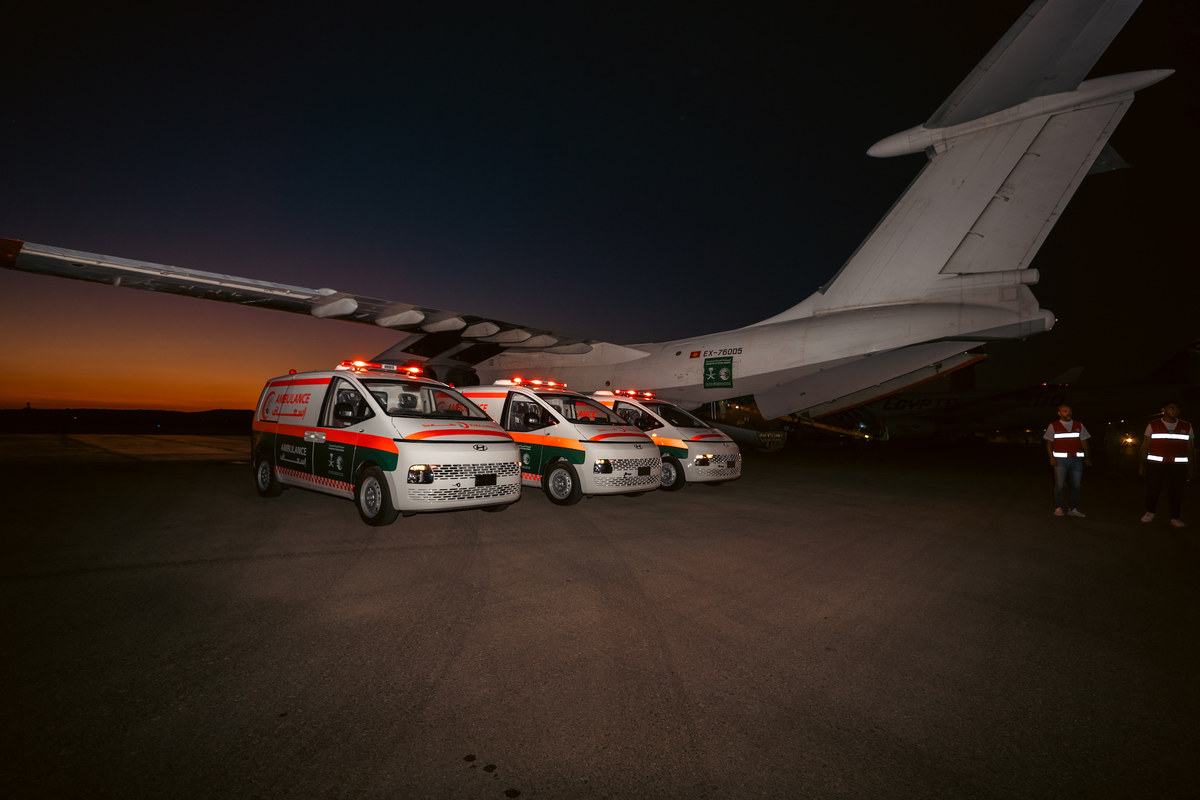
(AN photo by Abdulrahman Shalhoub)
“Being in Al-Arish made my eyes tear up as I remembered being there in 1999 with my family as we crossed the Rafah crossing and into Gaza,” said Joudah.
She also recalled other memories as she huddled by one of the little windows on the plane as they flew close to Gaza, a small strip of land that has dominated the world’s news in recent months, but an area that was always on the minds of many Palestinians, Arabs and the international community.
“I wish I could have done more; I wanted to cross into Gaza and do something. Taking pictures is one thing, I would have been able to show the world the reality of Gaza through my lens, but if only I could have crossed and played with one child, made him smile, do something to alleviate his pain for a few minutes, it would have meant the world to him,” said Shalhoub.
Nearly a month later, on Dec. 1, Zakaria made her way to newly opened Abu Dhabi International Airport after boarding the fourth UAE flight to airlift injured Palestinian children and cancer patients, along with their families, from Al-Arish Airport in Egypt after they had been evacuated from Gaza via the Rafah border crossing.
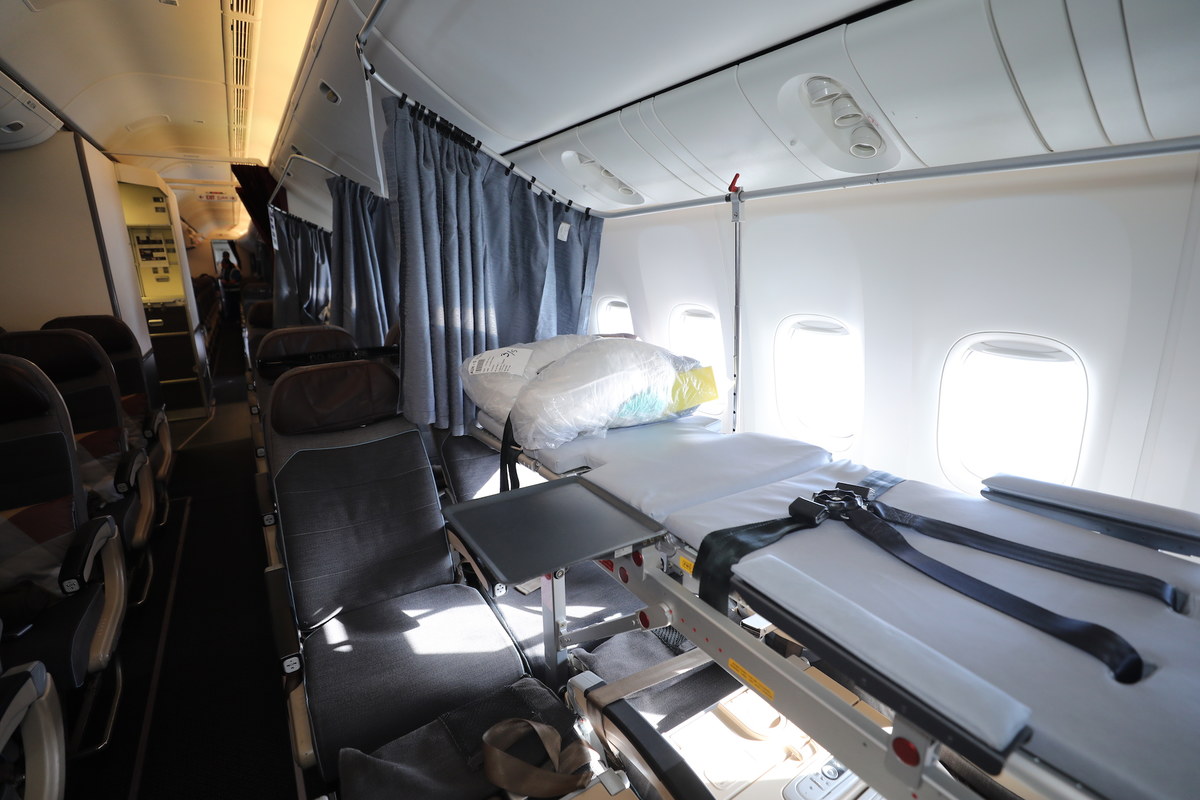
An Etihad Airways flight evacuated 120 injured Palestinians and their families. (AN photo by Mohammed Fawzy)
It was the day the week-long truce had ended, and Israel had resumed its intense bombardment over Gaza, primarily across Khan Younis and Rafah in the southern area, that morning. Only a few evacuees were lucky to leave through the border that day with airstrikes hitting near the area, said Zakaria.
“Aboard the flight to Al-Arish, a strange sense of warmth, solidarity and safety prevailed amid the turbulent times. I saw a beautiful side of humanity unfold for the first time since I started covering the brutal war extensively online,” Zakaria said.
Zakaria added: “The stillness and eerie silence of the desert stood in sharp contrast with the intense bombardment taking place behind Rafah crossing, which was only 55 km away, about a 45-minute trip from Al-Arish Airport.
“The dark sky was lit with stars that night, but the only light that people in Gaza could see was that of rockets and missiles raining over their homes.”
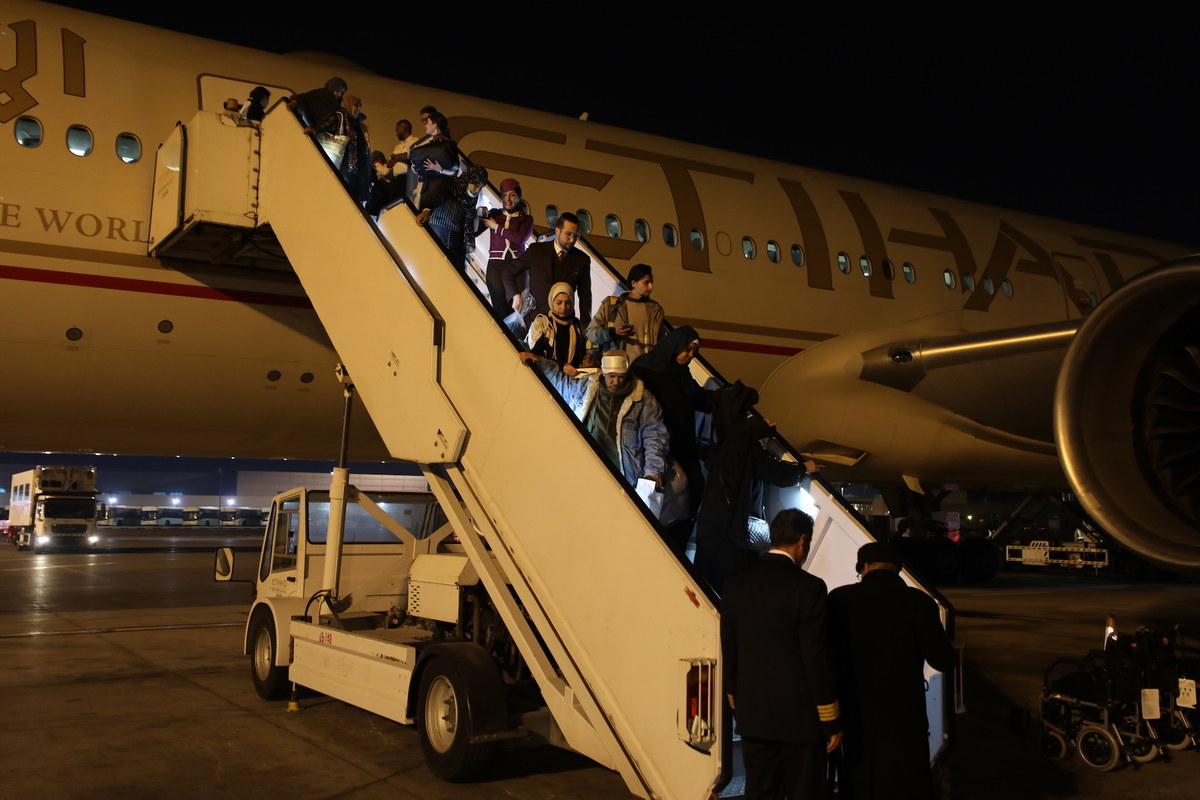
Patients from the Gaza Strip who were evacuated from Al-Arish have landed in Abu Dhabi. (AN photo by Mohammed Fawzy)
Nothing could have prepared Zakaria for what she was about to witness: the sight of weary, exhausted and elderly patients arriving in Egyptian ambulances and being transported to the tarmac on wheelchairs.
Children, some as young as two years old; men and women cold and alone: It was a heartbreaking scene of those who had made it through the gates of the crossing heading for a new life, while leaving loved ones behind.
Zakaria said: “Watching this scene unfold, the only question that echoed in my head was: What have those people done to be driven out of their homes in this condition? Deprived of the basic necessities of food, water, medicines, their families, memories and dreams.
Upon returning to the plane, Zakaria recalls seeing the faces of the passengers with shared common features: Eyes framed with intense black circles, frail figures, each carrying a small plastic bag with a few possessions, “and a gaze that simultaneously captured a mix of emotions — relief, guilt and hope.”
Zakaria spoke to many of the passengers as they made their way back to Abu Dhabi. All of them had lost family members, had been displaced at least four times in search for safe zones, and all left unsure if they would ever return to see their loved ones again.
They were the lucky few after surviving intense bombing and receiving clearance to go through Rafah after clearing a tedious process to pass through.
Many were not so lucky.
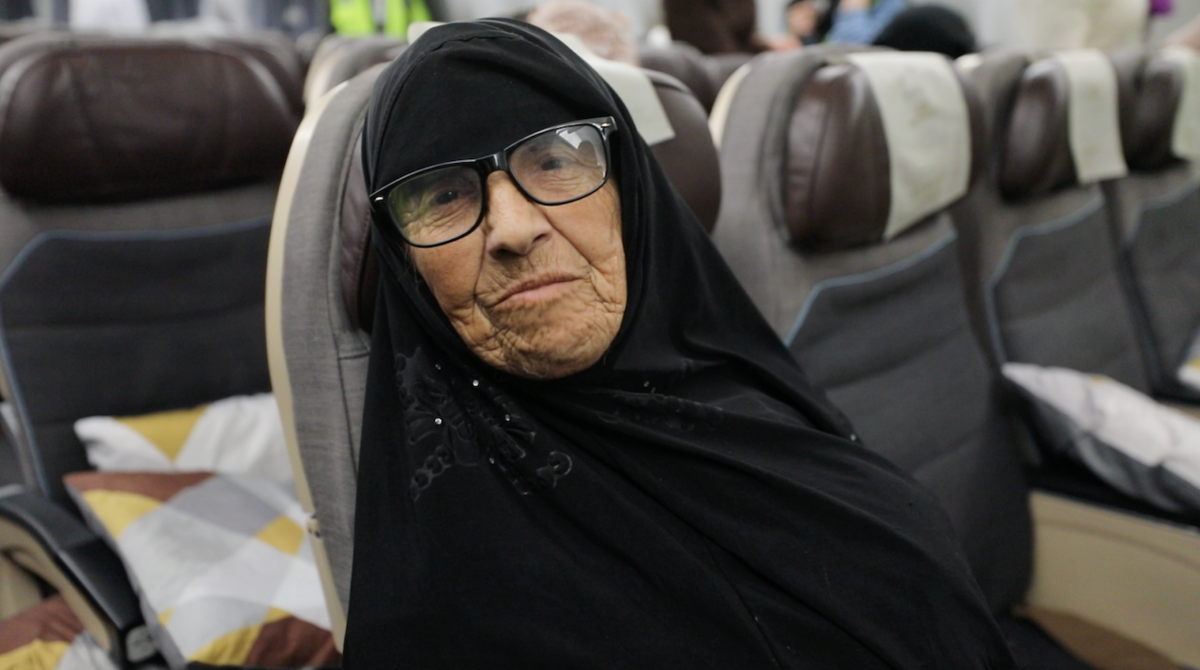
Palestinian woman Sabra Moussa was evacuated from the Gaza Strip to Abu Dhabi. (AN photo by Mohammed Fawzy)
Amna Hashem Saeed, an elderly pancreatic cancer patient, sat alone on the plane, tearfully telling Zakaria of her final moments with her only daughter. “I am left here to die, Mom,” Saeed repeated her daughter’s words as the city behind them was collapsing. Her husband had suffered a stroke a few weeks previously and has gone without treatment. Saeed herself had been refused the right to cross from Rafah for treatment in Turkiye seven times due to the security situation, before her evacuation to the UAE was finally accepted.
On the final leg of the flight, Zakaria told of how she saw a number of children, too young to comprehend the situation, either squirming in pain or playing with joy on the flight.
Among the children was 2-year-old Mohammed, who had no family except his ailing grandmother on the flight. “With his dreamy eyes and innocent smile, he climbed on my lap and played on the plane’s small screen before peacefully falling asleep in my arms until we landed in what must have been his first proper sleep in months,” said Zakaria.
“I don’t know the horrors this boy might have seen, but giving him this sense of safety was really humbling.”
She added: “It was difficult to comprehend that thousands of children like him will go to bed with the possibility that they will not see the next day.
“Walking by and seeing the child sleeping in my arms, Joe Coughlan, the flight’s medical commander, asked ‘Where else would you rather be?’
“My answer was ‘nowhere’.”

















